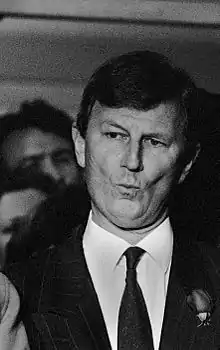1992 Labour Party leadership election
The 1992 Labour Party leadership election followed the Labour Party's failure to win the 1992 general election and the subsequent resignation of party leader Neil Kinnock.
| |||||||||||||||||||
| |||||||||||||||||||
| |||||||||||||||||||
There were only two candidates in the election, with John Smith always the clear favourite to win.[1] The ballot took place on 18 July 1992 at the Labour Party conference. Affiliated organisations had 40% of the vote, while Constituency Labour Parties and the Parliamentary Labour Party had 30% each in the electoral college. Gordon Brown and Robin Cook were both seen as potential candidates, but did not stand.
John Smith was elected in a landslide victory with 91% of the vote. This was the last Labour Party leadership election which used the trade union block vote; the system was reformed under Smith’s leadership to a one member, one vote system which was in place for the 1994 leadership election held two years later when Smith died suddenly of a heart attack.
Candidates
- Bryan Gould, Shadow Secretary of State for the Environment, Member of Parliament for Dagenham
- John Smith, Shadow Chancellor of the Exchequer, Member of Parliament for Monklands East
Result
| Candidate[2] | Affiliated block votes (40%)[3] |
CLP block votes (30%) |
PLP votes (30%) |
Overall result | |||||
|---|---|---|---|---|---|---|---|---|---|
| Votes | % | Votes | % | Votes | % | % | |||
| John Smith |
4,822 | 96.3 | 597 | 98.0 | 229 | 77.1 | 91.1 | ||
| Bryan Gould | 187 | 3.7 | 12 | 2.0 | 68 | 22.9 | 9.0 | ||
John Smith was elected leader of the Labour Party with a clear majority.
Shortly after Black Wednesday in September 1992, Labour's lead in the opinion polls began to rise. By the time of his sudden death, Smith was widely predicted and expected to become prime minister at the next general election.
In the event, he would only serve two years before his death, which precipitated another leadership election.
Notes
- "A Plea for Bloodshed". The Economist. 18 April 1992. p. 64.
- Labour Party
- Under the rules at the time of the contest, block votes were cast by delegates and the Parliamentary Party at Labour Party Conference. Affiliated Unions held 40% of the votes, CLPs 30% and the PLP 30%.
References
- Boothroyd, David. "Leaders of the Labour Party". United Kingdom Election Results. Archived from the original on 24 April 2018. Retrieved 16 May 2015.
- LeDuc, Lawrence (26–31 March 1999). "Leadership Selection and Party Renewal" (PDF). The Consequences of Candidate Selection. 27th ECPR Joint Sessions of Workshops. Mannheim: European Consortium for Political Research. pp. 8–12. Retrieved 16 May 2015.
